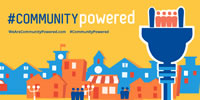Water Conservation Tips
Be a Leak Seeker! Leaks Can Run, But They Can’t Hide!
The most common source of leaks is the toilet. Listen for running water in the bathroom. If it sounds like your toilet tank is filling when it hasn’t been flushed, you may have found the leak. If so, it will need to be repaired. Other common causes can be leaky faucets, worn washers on garden hoses, or faucets left open accidentally. Don’t forget to check you irrigation system too!
Remember… fixing leaks and avoiding unnecessary water use helps conserve our most precious resource – and save money on your bills.
Inside Conservation
- Turn off the water when you brush your teeth and shave.
- Install low-flow toilets, shower heads and faucet aerators and you’ll save thousands of gallons/liters of water a year. It’s a savings that should reduce your water bill.
- Check out leaks and get them fixed! A dripping faucet can waste up to 2000 gallons/7600 liters of water a year. A leaky toilet can waste as much as 200 gallons/260 liters of water a day.
- Fill a pitcher with tap water and put it in the fridge, rather than running the tap every time you want a drink.
- Defrost frozen food in the refrigerator or in the microwave instead of running water over it.
- When washing dishes by hand, use two basins – one for washing, the other for rinsing – rather than letting the water run.
- Insulate your water heater and all hot water pipes. Less water will be wasted before hot water flows.
Outside Conservation
- Use a broom, rather than the hose to clean sidewalks and driveways.
- Use a bucket of water, sponge and a hose with a shut-off nozzle to wash your car.
- If you have a swimming pool, get a cover for it and you’ll cut the loss of water by evaporation by 90%.
Landscaping
- Follow PWC’s year round Odd/Even watering schedules.
- Plant low-water-use grasses and shrubs to cut your lawn watering by 20 – 50%.
- Place a layer of mulch around trees and plants to retain water.
- Never water at the hottest times of the day or when it’s windy.
- Turn off your sprinklers when it’s raining.
- Use a moisture indicator to tell when your lawn needs watering and when it doesn’t.
- Adjust sprinklers so only the lawn is watered, not the house, sidewalk or street.
- When watering steep slopes, use a soaker hose to help prevent wasteful runoff.
- Consider installing drip irrigation for individual bushes, trees, flowers, and garden areas. This method gets water slowly and directly to the plant roots where it’s needed most.
- Visit the Waterwise Garden the Cape Fear Botanical Gardens to learn more tips of saving water. Learn More
Water Quality & Safety
- Lawn and garden pesticides and fertilizers can pollute the water. Reduce your use of these and look for safer alternatives to control weeds and bugs.
- Take used motor oil and other automotive fluids to an automotive service center that recycles them.
- Patronize automotive centers and stores that accept automotive batteries for recycling.
- Take leftover paint, solvents and toxic household products to special collection centers.
- Use phosphate-free detergents.
- Choose natural cleansers – borax, ammonia, vinegar or baking soda.
- Use rechargeable batteries.
- Choose organic paint and natural finishes – wax and organic wood stains and natural preservatives.









